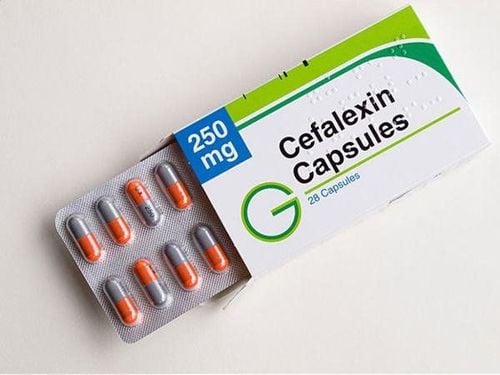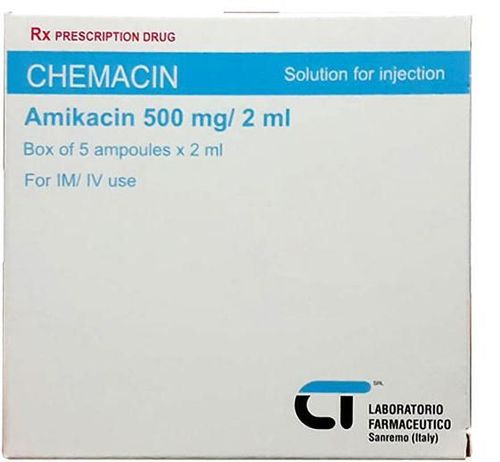This is an automatically translated article.
Nitrofurantoin is a drug containing nitrofuran derivatives, used in the treatment of urinary tract infections and only used for 5-7 days. The following article will provide some information to keep in mind when using the drug Nitrofurantoin.
1. What is Nitrofurantoin?
The main active ingredient in the drug is Nitrofurantoin, which is used to fight bacteria in the urinary tract. The drug is prepared in the following forms:
Tablets: Nitrofurantoin 50mg, Nitrofurantoin 100mg; Capsules: Nitrofurantoin 25mg, Nitrofurantoin 50mg or medicine Nitrofurantoin 100mg; Suspension: Nitrofurantoin 25mg/ml. Indications for use of Nitrofurantoin:
This is an antibiotic indicated for the treatment of cystitis caused by susceptible strains of bacteria found in women (over 6 years old). These patients cannot take other antibiotics. Oral nitrofurantoin can be used in emergencies in patients with a history of cystitis. Contraindications to the use of Nitrofurantoin:
Cases of hypersensitivity to Nitrofurantoin; People with severe renal failure or anuria or oliguria or impaired renal function; People who are deficient in glucose 6 phosphate dehydrogenase ; People with porphyrin metabolism disorders; Children under 3 months old; Pregnant women at 38 - 42 weeks, have just given birth; The drug is not used to treat urinary tract infections in men.
2. Dosage and how to use Nitrofurantoin medicine
For adults:
Treatment of uncomplicated acute urinary tract infections will use Nitrofurantoin 100mg, each time 12 hours or 6 hours apart with Nitrofurantoin 50mg. In the case of recurrent severe urinary tract infections, Nitrofurantoin 100mg should be used every 6 hours for 7 days. For users to prevent recurrent urinary tract infections will use Nitrofurantoin 50-100mg / time / day before going to bed; For children over 3 months old:
Treatment of uncomplicated acute urinary tract infections will use Nitrofurantoin 3mg/kg/day divided into 4 times. If used to prevent recurrence, will take Nitrofurantoin 1mg/kg before going to bed; For patients with renal failure:
Creatinine clearance > 60 mL/min is indicated as the usual dose; If creatinine clearance < 60 mL/min, hemodialysis or peritoneal dialysis, nitrofurantoin should not be used.
3. Side effects when taking the drug Nitrofurantoin
During the use of Nitrofurantoin, the patient may experience some side effects caused by the drug such as:
Fever; feeling of muscle pain; dry mouth; Feeling headache or dizzy; Polymorphonuclear leukocytes increased, eosinophils increased; Digestive disorders (nausea, vomiting, diarrhea); Skin rash or urticaria or itching; There are symptoms similar to those of chronic hepatitis or jaundice, cholestasis Transaminase increased; Chest X-ray shows increased fibrous band, pulmonary infiltrates, pleural effusion, patients find it difficult to breathe, wet rales, asthma; Peripheral neuropathy. Some other side effects have been recorded when patients take Nitrofurantoin, but less common include:
Black stools; bloody urine; Burning sensation, numbness, sore throat; Patient has difficulty walking; Unusual bleeding or bruising on the body; Feeling tired, weak body. Rare side effects have been reported:
Decreased polymorphonuclear leukocytes, decreased platelets, anemia or hemolysis in hereditary glucose 6 phosphate dehydrogenase deficiency, increased intracranial pressure, Parotid gland inflammation; Pulmonary fibrosis, hair loss, nystagmus, systemic lupus erythematosus.
4. Some information to note when using Nitrofurantoin
General note when using Nitrofurantoin:
In the case of Nitrofurantoin treatment, it is necessary to monitor lung function, if abnormal signs are detected in the lungs, the drug should be stopped immediately; People with a history of lung, liver, neurological or allergic disorders need to be very careful when using the drug; People who are susceptible to peripheral neuropathy are patients being treated for asthma, diabetes, electrolyte imbalance, vitamin B deficiency in the body. If signs of progressive peripheral neuropathy are detected, You should also stop taking the medication immediately. Monitor closely and stop the drug as soon as symptoms of hepatitis are detected; For patients receiving long-term nitrofurantoin treatment, renal function should be further monitored. If creatinine clearance is less than 60 mL/min, discontinue use immediately; Patients with suspected glucose-6-phosphate dehydrogenase (G6PD) deficiency who develop signs of hemolytic disease should also discontinue nitrofurantoin; During treatment with nitrofurantoin, some patients developed diarrhea and pseudomembranous colitis caused by Clostridioides difficile. If the level is moderate, additional fluids, electrolytes and proteins are required. If severe, need to use more antibiotics (Metronidazole or Vancomycin); For the elderly, in order to avoid acute respiratory complications due to the high risk of poisoning, special caution should be taken and consult a doctor about the appropriate dose when using Nitrofurantoin. Note when using Nitrofurantoin with pregnant women:
For pregnant women with urinary tract infections, the drug Nitrofurantoin is the most appropriate drug to treat. However, patients need to consult a doctor and take the medicine as directed. Absolutely do not use Nitrofurantoin with women entering the pregnancy from 38 to 42 weeks. Note when using Nitrofurantoin with people who are breastfeeding:
People who are breastfeeding can use Nitrofurantoin to treat urinary tract infections. Not for use by women who are breast-feeding but have children with G6PD deficiency. Note when using Nitrofurantoin with people driving or operating machinery:
Nitrofurantoin's side effects are drowsiness. Therefore, absolutely do not drive or operate machinery while using the drug. Treatment when overdosing or forgetting dose of Nitrofurantoin:
People using Nitrofurantoin overdose will have symptoms of nausea and vomiting. There is no specific antidote when taking an overdose of Nitrofurantoin, the patient will be given a sufficient volume of fluids to enhance urine excretion or hemodialysis. In case the patient forgets to take the medicine, it should be taken as soon as possible when detected. If the missed dose is detected close to the time of taking the next dose, do not take the missed dose, just take the next dose to avoid taking a double dose in one dose. Nitrofurantoin is a prescription drug, so make sure you consult your doctor before using it. Hopefully, the article has provided you with useful information about the uses, doses and precautions when using Nitrofurantoin.
Please dial HOTLINE for more information or register for an appointment HERE. Download MyVinmec app to make appointments faster and to manage your bookings easily.













